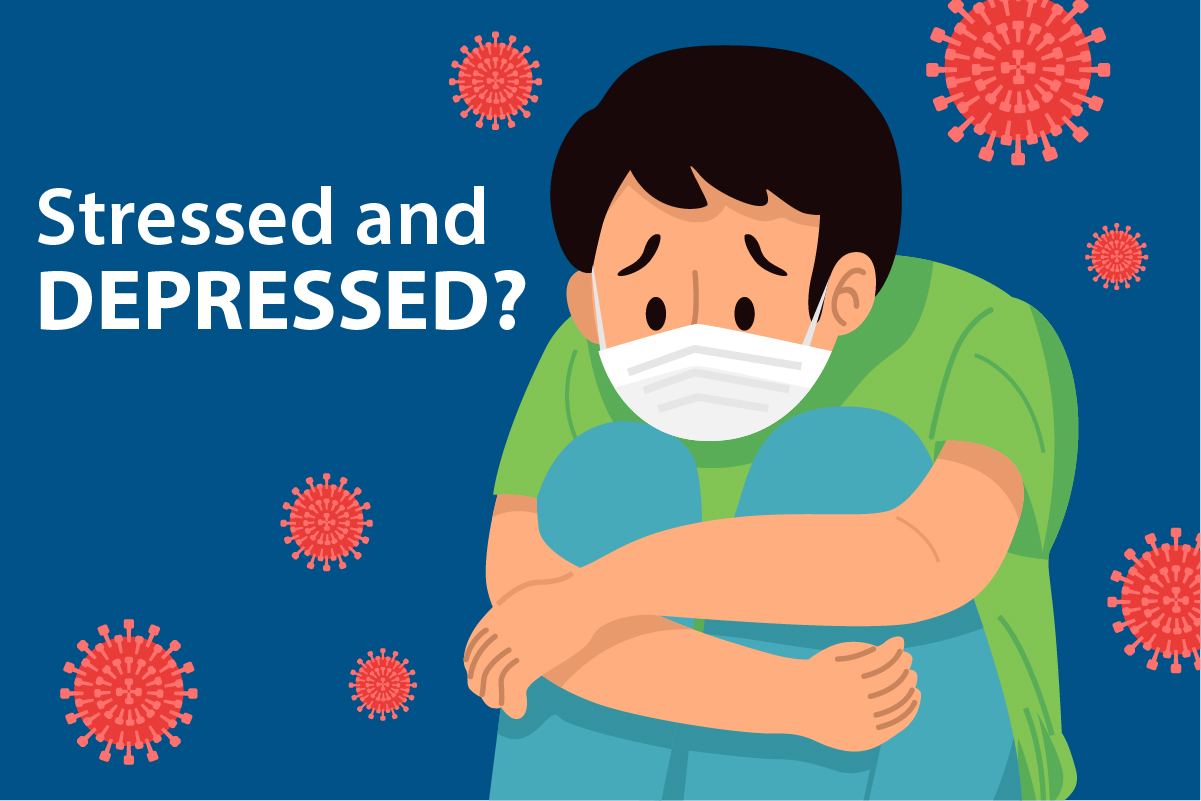Stressed and Depressed: Don’t Let COVID-19 Make You a Mess

Feeling blue from the impacts of the COVID-19 pandemic? You aren’t the only one. Here’re tips that can help!
Have the effects of COVID-19 got you feeling down? Fear of illness, death, limited social interaction, restricted travel, business closings, mask wearing, home schooling, changes in virtually every aspect of life – it can all be overwhelming. According to the JAMA (Journal of the American Medical Association) Network, depression in U.S. adults has basically tripled since the COVID-19 pandemic began. Those who had previous financial worries have been particularly hard hit. Now, more than ever, we need to pay attention to our mental health and make sure we are taking steps to help keep it in check.
Strongly linked to our mental health is our physical health. Making good decisions about food and exercise are great places to start in effort to help keep “the blues” away. According to the Centers for Disease Control and Prevention (CDC), physical activity can reduce your risk of depression and anxiety and help you sleep better. It doesn’t need to be intense activity, just a brisk walk can be beneficial. Regular exercise releases endorphins and other natural brain chemicals that can enhance your sense of well-being. Generally, it is recommended that you exercise at least 20 to 30 minutes a day, three days a week. If you’ve been inactive for a while, take it slow to start out, and then build up to more frequent and longer or more intense exercise. Try not to make exercise a chore by possibly making it a break from work, or by joining a friend or group that can safely exercise together.
Eating habits can also impact mental health. Consuming a balanced diet full of vegetables and fruits while limiting sugary or processed foods can help. People who follow extremely low carbohydrate diets can run the risk of feeling depressed because brain chemicals, like tryptophan and serotonin that promote a feeling of well-being, are triggered by carbohydrate-rich foods. That doesn’t mean to load up on carbohydrates which can add weight, but cutting them out completely could have a negative impact. Vitamins are also important in your diet. Vitamin deficient diets have shown to be more common in patients diagnosed with depression and anxiety. Including vitamin rich foods like fruits and vegetables in your everyday eating habits and/or taking vitamin supplements will help your body perform and feel at its best. Improving your diet and physical health can have a positive impact on your mental outlook.
Another suggestion to help your mental health during COVID-19 is to volunteer or take an active community role to feel more connected. There have been many studies to suggest that volunteering can help counteract mental stress, anxiety and depression. Researchers have found that being helpful to others can induce a feeling of happiness and satisfaction. It can give people a sense of purpose and boost their feelings of social connection. Particularly for older individuals, volunteering can help alleviate loneliness and create a support structure and sense of belonging. The people you help can also benefit and feel better from your kindness and connection. Although volunteering may seem a little difficult during times of COVID-19, there are a number of safe ways for folks to get out into the community to help those less fortunate. A few starter ideas are:
- Donate to or help volunteer at a local food bank
- Deliver Meals on Wheels to shut-ins or those who can’t go to the store
- Donate blood
- Bake treats and drop them off for front line workers (EMTs, Firefighters, Paramedics, Hospital staff)
- Volunteer at a clothing donation charity or thrift store
- Make phone calls for a local church or community center to check on the elderly and neighbors
- Tutor a student virtually
You can also check local churches, government groups and community centers for volunteer opportunities. Chances are there is a group that would love your help and that you could benefit from helping.
If you find yourself still struggling with depression, anxiety, stress, tell your Adena Primary Care Provider, or contact the Adena Counseling Center at 740-779-4888.
If you’re experiencing a more serious mental health crisis and need immediate support, contact the National Suicide Prevention Lifeline at 1-800-273-TALK (8255) or text #4HOPE to 741-741.

